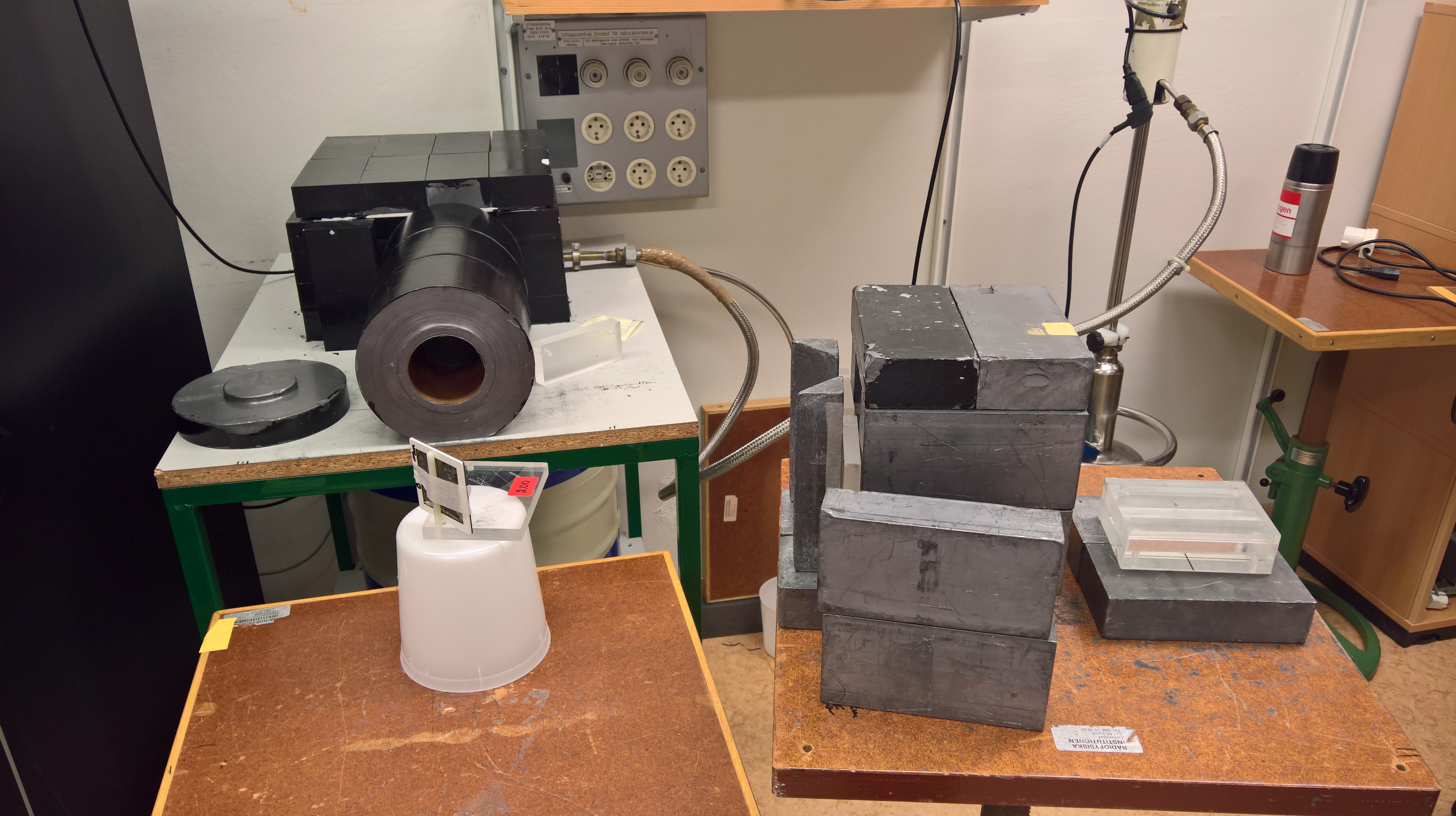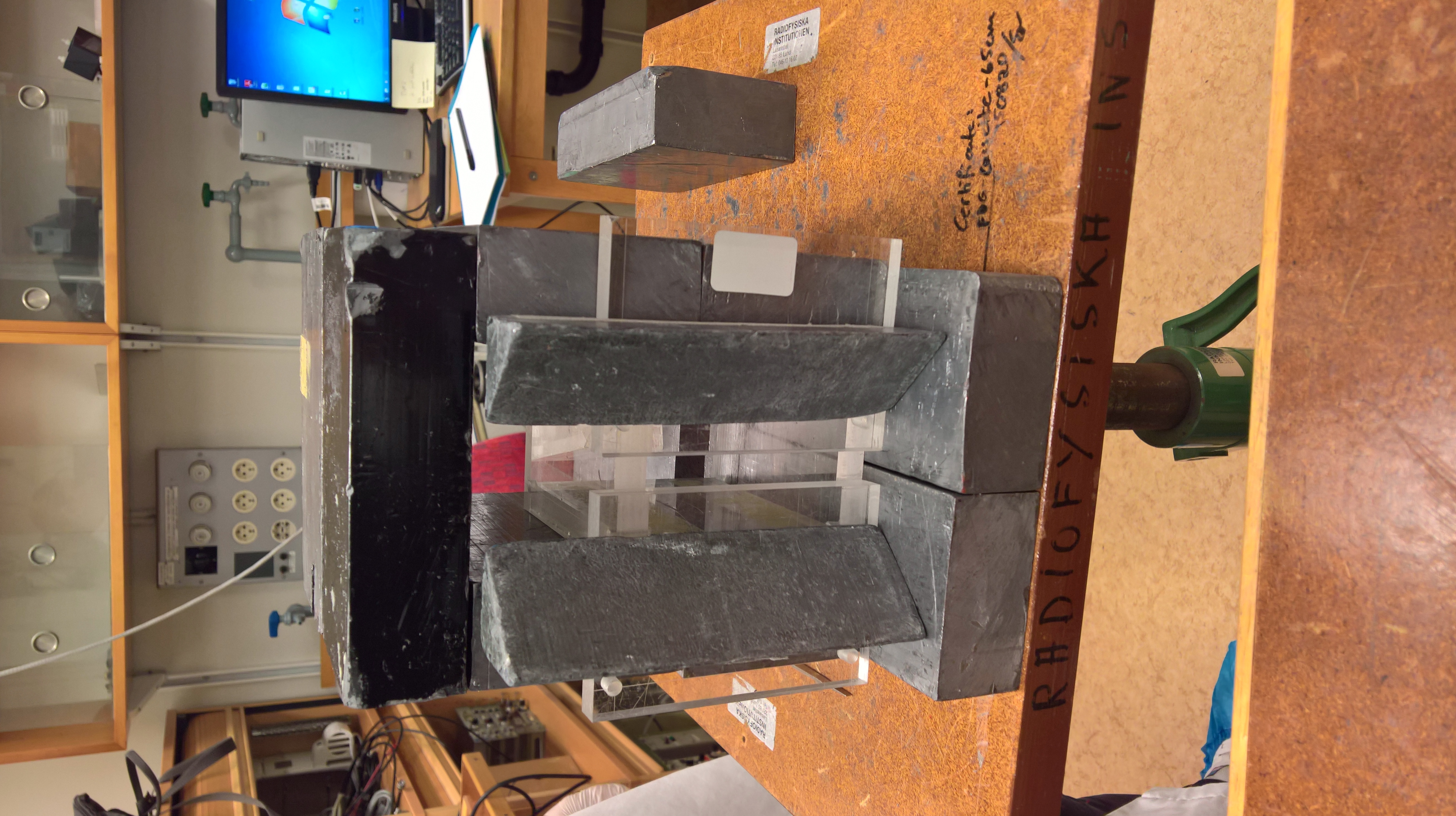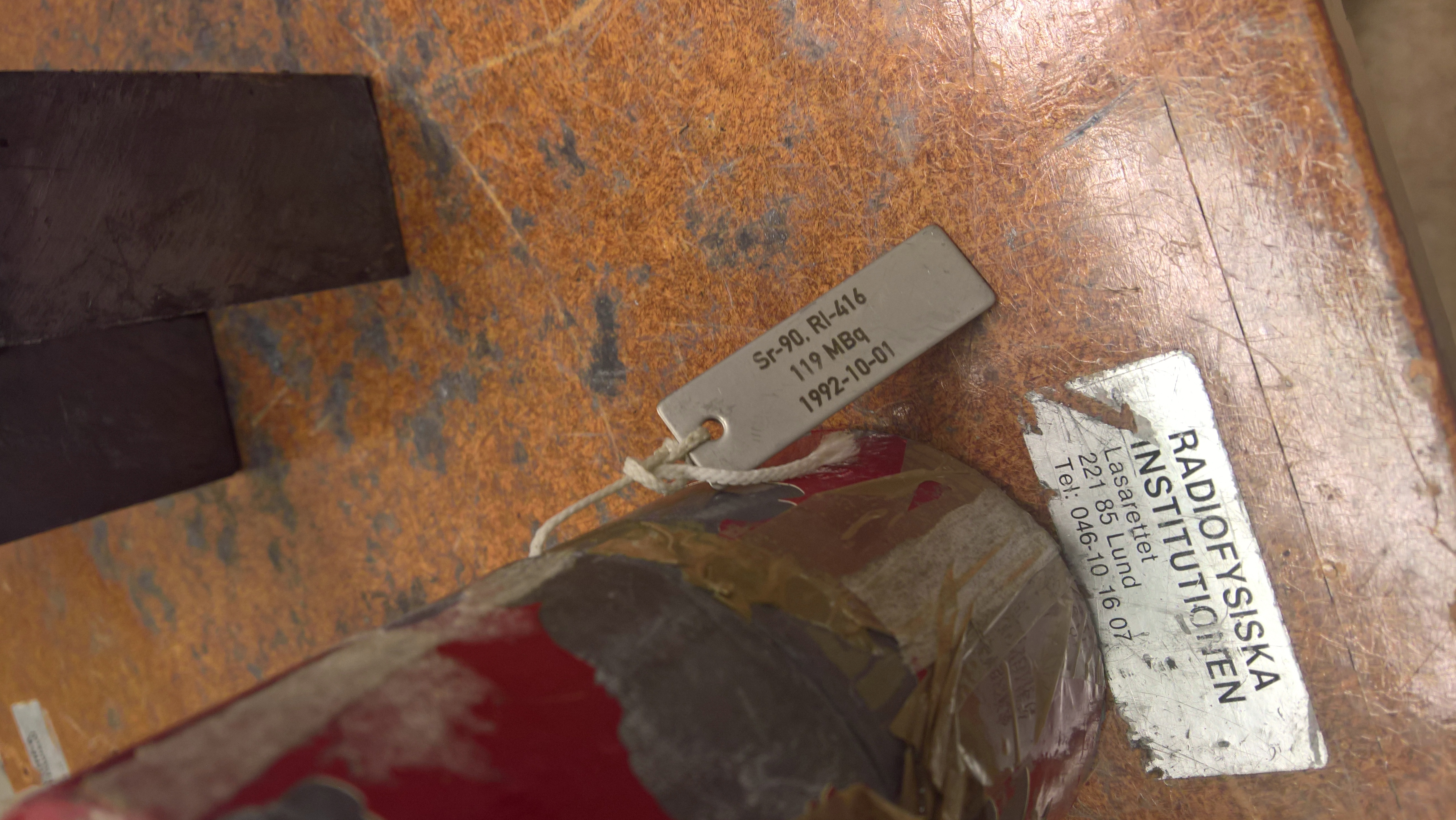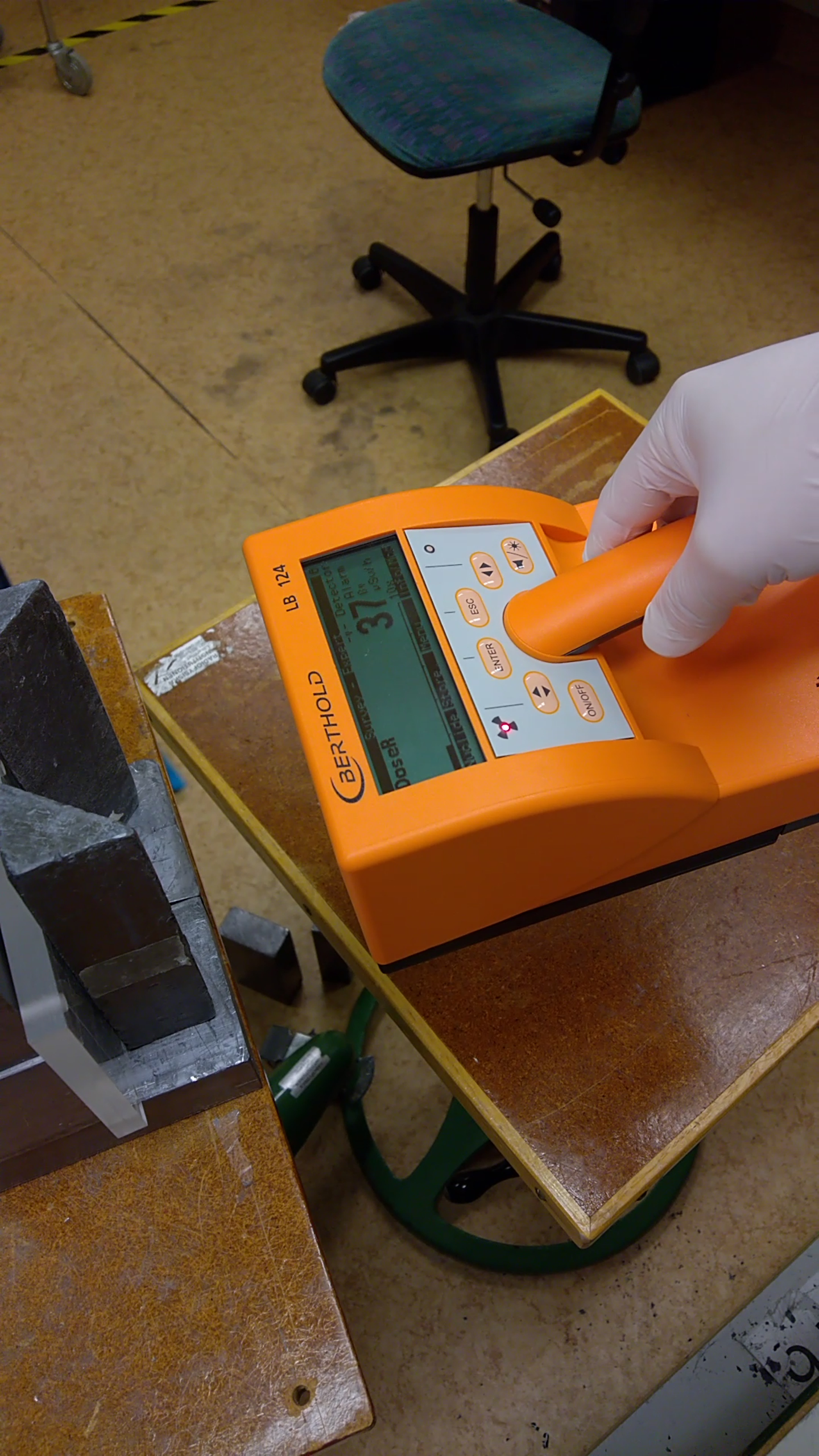- Forum
- Experiments and Projects
- Experiments
- Measuring Bremsshtralung from Lead target using beta particles
Measuring Bremsshtralung from Lead target using beta particles
- AstroW
-
 Topic Author
Topic Author
- Visitor
-

9 years 4 months ago - 9 years 4 months ago #2594
by AstroW
Measuring Bremsshtralung from Lead target using beta particles was created by AstroW
Today I performed a series of experiments measuring the Bremssshtralung in Lead. The source of beta-particles (electrons) to produce the photons was Sr-90 at roughly 50 Mbq (ish).
The detector used was a GE-detector cooled with LN2. The setup included ALOT of shielding lead blocks and plexiglas. The energies detected was multiplied and sent to our computer so we could get a nice spectra of the bremssthralung. I will add some pics of this setup, deep down in a basement at the university at Lund.
The part of this laboration was firstly to determine what geometry was the best for the setup to get as much photons out of the lead target into the detector. The second part was to be able to shield the source and setup in a satisfying and safe way. We wanted to fullfill narrow-beam-approximation and I had an handheld large detector to detect gammas and betas of different angels around the setup. At some angles around the target the radiation intensified and the monitor started to alarm, can you guess why it only alarms for certain angles (not all) around the lead-target hit by electrons from the source which was a couple of decimeters away?
Here is a picture of the setup.
To the left one can see a lead tube leading to the well shielded GE-detector which are cooled by LN2 in order to operate correctly.
The lead target is in front of the tube, placed in a piece of white plastic. Within the lead bricks to the right the source of Strontium-90 is placed in order to emit electrons towards the lead target to the left. In this pic the source was not put in yet.
This is where we put the source. In this pic its easier to see how we wanted to achieve narrow-beam-approximation; that is in short terms a narrow beam of radiation, in this case we used plexiglass to stop the electrons and the lead to stop the gamma rays created by the electrons.
A small note tells us what the activity was back in -92
Me measuring gamma, the detector also has a beta-window but I didnt want to stay close to the source more than I needed to. I think the detector peaked at 40 uSv/h for gamma in that position.
The detector used was a GE-detector cooled with LN2. The setup included ALOT of shielding lead blocks and plexiglas. The energies detected was multiplied and sent to our computer so we could get a nice spectra of the bremssthralung. I will add some pics of this setup, deep down in a basement at the university at Lund.
The part of this laboration was firstly to determine what geometry was the best for the setup to get as much photons out of the lead target into the detector. The second part was to be able to shield the source and setup in a satisfying and safe way. We wanted to fullfill narrow-beam-approximation and I had an handheld large detector to detect gammas and betas of different angels around the setup. At some angles around the target the radiation intensified and the monitor started to alarm, can you guess why it only alarms for certain angles (not all) around the lead-target hit by electrons from the source which was a couple of decimeters away?
Here is a picture of the setup.
To the left one can see a lead tube leading to the well shielded GE-detector which are cooled by LN2 in order to operate correctly.
The lead target is in front of the tube, placed in a piece of white plastic. Within the lead bricks to the right the source of Strontium-90 is placed in order to emit electrons towards the lead target to the left. In this pic the source was not put in yet.
This is where we put the source. In this pic its easier to see how we wanted to achieve narrow-beam-approximation; that is in short terms a narrow beam of radiation, in this case we used plexiglass to stop the electrons and the lead to stop the gamma rays created by the electrons.
A small note tells us what the activity was back in -92
Me measuring gamma, the detector also has a beta-window but I didnt want to stay close to the source more than I needed to. I think the detector peaked at 40 uSv/h for gamma in that position.
Last edit: 9 years 4 months ago by AstroW.
Please Log in or Create an account to join the conversation.
- AstroW
-
 Topic Author
Topic Author
- Visitor
-

9 years 4 months ago - 9 years 4 months ago #2596
by AstroW
Replied by AstroW on topic Measuring Bremsshtralung from Lead target using beta particles
Cant upload the pics so will link to them later today!
Last edit: 9 years 4 months ago by AstroW.
Please Log in or Create an account to join the conversation.
9 years 4 months ago #2599
by mw0uzo
Replied by mw0uzo on topic Measuring Bremsshtralung from Lead target using beta particles
Is it size limit error?
Please Log in or Create an account to join the conversation.
- AstroW
-
 Topic Author
Topic Author
- Visitor
-

9 years 4 months ago #2600
by AstroW
I dont get any error, it wont upload at all, the page just reloads without uploading the pics!
Replied by AstroW on topic Measuring Bremsshtralung from Lead target using beta particles
Is it size limit error?
I dont get any error, it wont upload at all, the page just reloads without uploading the pics!
Please Log in or Create an account to join the conversation.
- AstroW
-
 Topic Author
Topic Author
- Visitor
-

9 years 4 months ago #2601
by AstroW
Replied by AstroW on topic Measuring Bremsshtralung from Lead target using beta particles
And here are the answer to my question stated above 
The intensity of the photons created from the incident electrons will depend on the energies of the electrons, hence there will be more or less photons at certain angles. This is something you must take into account when doing this kind of experiments so you know where you shouldnt stand
You find a good representation of the concept Here
The intensity of the photons created from the incident electrons will depend on the energies of the electrons, hence there will be more or less photons at certain angles. This is something you must take into account when doing this kind of experiments so you know where you shouldnt stand
You find a good representation of the concept Here
Please Log in or Create an account to join the conversation.
Moderators: Gamma-Man
- Forum
- Experiments and Projects
- Experiments
- Measuring Bremsshtralung from Lead target using beta particles
Time to create page: 0.143 seconds




